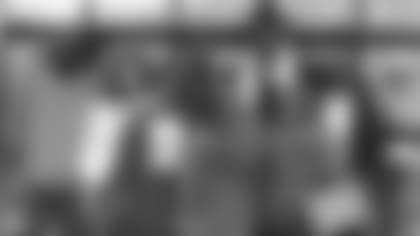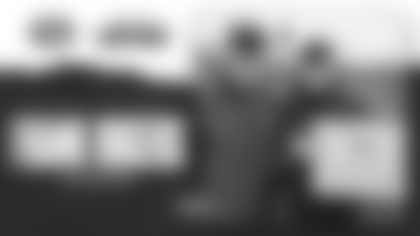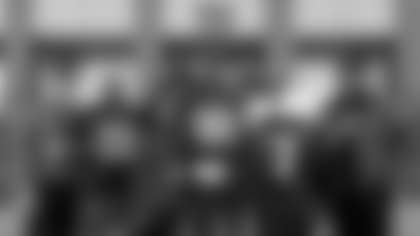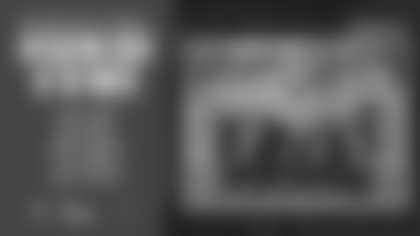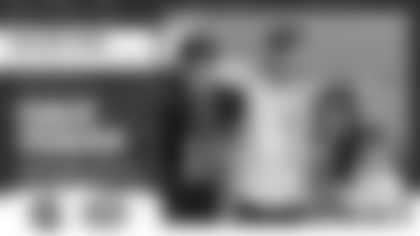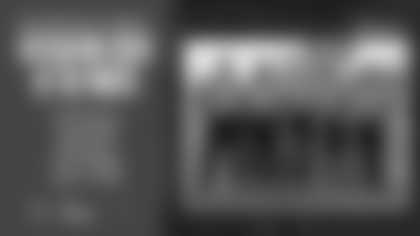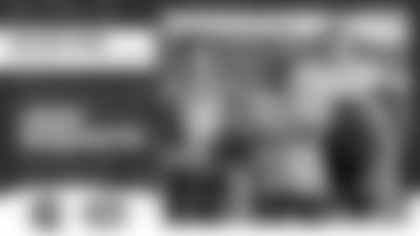The gear is hard to miss.
Each October, NFL players, coaches and referees add pieces of flair to their gameday attire to highlight the fight against cancer through the "Crucial Catch" campaign. This is the 12th consecutive season the league has partnered with the American Cancer Society, and early on, they focused primarily on breast cancer with neon pink accentuating stadiums across the league. But in recent years, they have added more colors to raise awareness for all cancers.
That unfortunately is fitting for Giants rookie Matt Peart, whose history with cancer is weaved with tie dye.
His grandmother, Dorothy Banton, passed away due to the spread of breast cancer. The same happened to his cousin, "Auntie" Sophia Steele. His father, Colin, is a prostate cancer survivor after originally being diagnosed in 2011. His older brother, Claude, currently deals with chronic myelogenous leukemia (CML).
"People should get checked in order to catch things early so it doesn't become a problem later," said Peart, an offensive tackle gearing up for the Giants' designated "Crucial Catch" game on Sunday vs. Washington. "I'll definitely be playing for my whole family."

The goal of this month is to promote early detection, getting screened, and reducing risk across multiple types of cancers. That's what helped Matt's 36-year-old brother and mentor. Claude was diagnosed 13 years ago when he went in for a checkup after getting sick out of the blue.
"I just remember not going to school and going to the hospital to find out if we were a bone marrow match for him," said Matt, who was 10 at the time. "After a while, me being a curious kid, I would ask, 'Yo, what's happening? What's happening?' Then I found out he had it, and it's been crazy because my brother is a very giving person. He's one of the last people you'd expect to have something like this. He's probably the most giving person in our family. He's essentially the Gorilla Glue to everything. He keeps the whole family together. It kind of hit me in a weird way. It's like, wow, it's wild because with my grandma and then my aunt – you can't take my brother."
The family members were not a match for bone marrow, but fortunately, since doctors caught it early, Claude is able to manage his health through drug therapy. He is still a "high-spirited" brother to Matt, who talks to him two or three times a day on the phone as he navigates an unprecedented year for a rookie.
"Honestly, he'll give you his last dollar if you want it," Matt said. "For him to go through that, it was crazy. The main reason why I play football is just to make sure he doesn't need to work anymore."
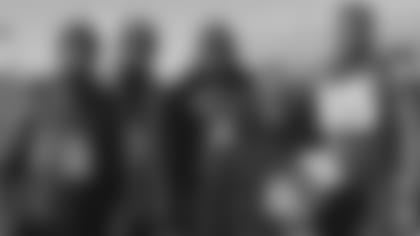
Matt, who was once described by the Giants' front office as a "skinny" 6-foot-7, 318-pound prospect out of UConn, said Claude has the build to be a football player. But by the time the family moved from Jamaica to The Bronx, Claude was already in college. Instead of playing, he organized the family tailgates and mentored his younger brother as he came up through the ranks.
After moving from his birthplace of Kingston, Matt was accepted to the Governor's Academy, a boarding school in Byfield, Massachusetts, through the Oliver Scholars program for high-achieving students. A few years later, he was drafted in the third round by his favorite NFL team.

While living out his dream, he now has the platform to raise awareness for a cause that hits too close to home. It also comes at a time when every facet of life has been affected due to the coronavirus pandemic, which has had a devastating impact on screening.
According to the NFL and American Cancer Society, routine cancer screenings have dropped since March 2020, resulting in a screening rate decrease between 86% and 94% for some cancers. Through Crucial Catch, resources are being allocated for the safe restart of cancer screenings in communities with the most need. For many forms of cancer (breast, cervical, colorectal and prostate), the five-year survival rate is above 90% when detected early.
"It's to help them get back on their feet because of COVID," said Margaret Belch, the strategic director of regional sports and entertainment at the American Cancer Society. "As we know, everything has kind of been shut down, people have been at home, a lot of people haven't been following up with their doctor appointments, with their annual visits. So it's really helping those [Federally Qualified Health Centers] get through that backlog and help get those folks in and screened and checked so that we can catch up and make sure that everybody is doing what they need to do."
Since 2012, the NFL has funded ACS' Community Health Advocates Implementation Nationwide Grants for Empowerment and Equity (CHANGE), which has contributed to 370,000 screenings in underserved communities and reached more than 1,070,000 million individuals with education, screening reminders and patient navigation, bringing these life-saving messages and screening services to those who need them most.
The pandemic has affected every industry, and the ACS has not been immune. Belch said the loss of income has led to a decrease in potential research, which will have ramifications for years.
"That's the research that might be coming up with the next great test or some way for us to be able to help somebody overcome cancer," Belch said. "It's kind of frightening and also with the delay to potentially catch cancer now that we're all backed up with the screening, there is a fear that we're going to find things later, which make them harder to treat."
Social distancing also forced the ACS to reimagine fundraisers.
Locally, organizers combined four events, which normally would have been spread throughout the year, into a single "NYC United Against Cancer Virtual Event" on October 1. Featured in the event was Giants defensive lineman Dalvin Tomlinson, who is an American Cancer Society Ambassador in honor of his father after he passed away from cancer when Dalvin was 5 years old. Tomlinson helped host a conversation on the inequalities in healthcare and the work that the NFL's "Crucial Catch" program has done to provide funding and cancer screenings in communities of need.
Additionally, in the fight against cancer, the Tom Coughlin Jay Fund honored Eli Manning with the Giants of Compassion Award for being a tremendous advocate for childhood cancer and his work with Tackle Kids Cancer at Hackensack Meridian Hospital, at their Champions for Children Virtual Gala earlier this month.
The Giants committed to funding one scholarship with the American Cancer Society's new Diversity Research Internship Program. The Diversity Research Internship Program will place participating interns in cancer research labs at leading institutions across the country to provide a hands-on experience for these burgeoning researchers, while receiving mentorship from leading scientists in the field.
The Giants and Gatorade also selected Steve DiGregorio of Nutley High School (N.J.) as the Lou Rettino High School Coach of the Week for Week 4 of the 2020 season. Coach DiGregorio, a Nutley native, is in his 12th season as head coach of the Nutley Raiders. In 2017, he started his battle with cancer, which caused him to miss the 2019 season as he began six months of chemotherapy. Throughout that time his community rallied around him and provided the support he needed to get back on the sideline with his team. DiGregorio has since returned and the Raiders defeated West Side (Newark, N.J.) on the road, 31-18, to start the season. He served as an assistant coach from 1987-1999 at Princeton University, where he coached Giants offensive coordinator Jason Garrett and Giants alumnus Keith Elias.
So, when you see those tie dye colors on the sideline this month, remember their stories. And to get checked.
"To see the guys on the sideline with the tie dye hat or bandana and these different things, it means a lot," Belch said. "And I think also for cancer patients and survivors as well, it just means so much that here are these tough guys, they're famous, they're football players, here they are taking time out of their day or just showing their support. What's great about them is they are so bright, you can't miss them."

Nominate a frontline worker as "A Giant Hero"
Fans can nominate frontline workers for their efforts during the coronavirus pandemic.



